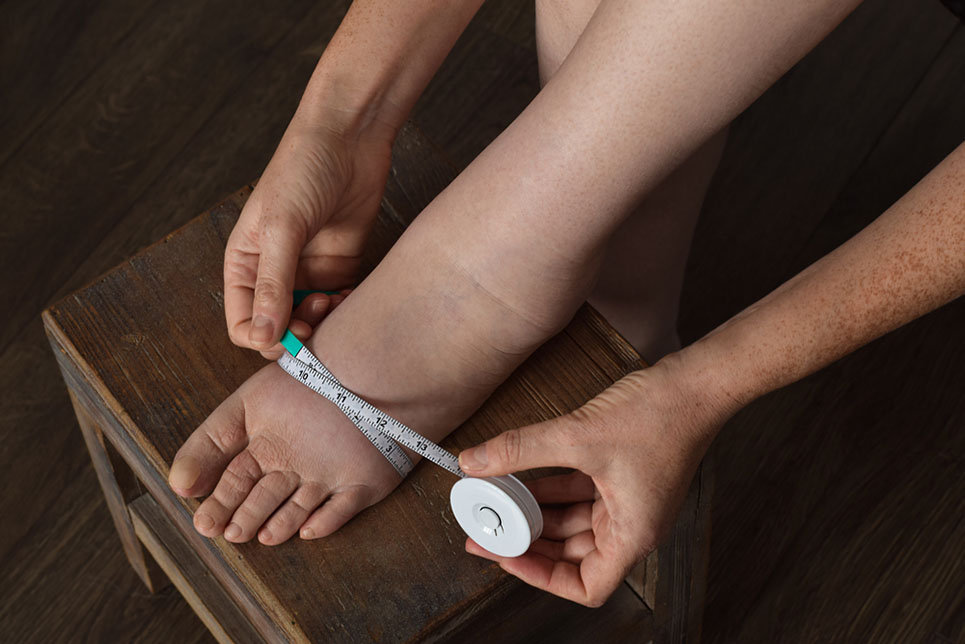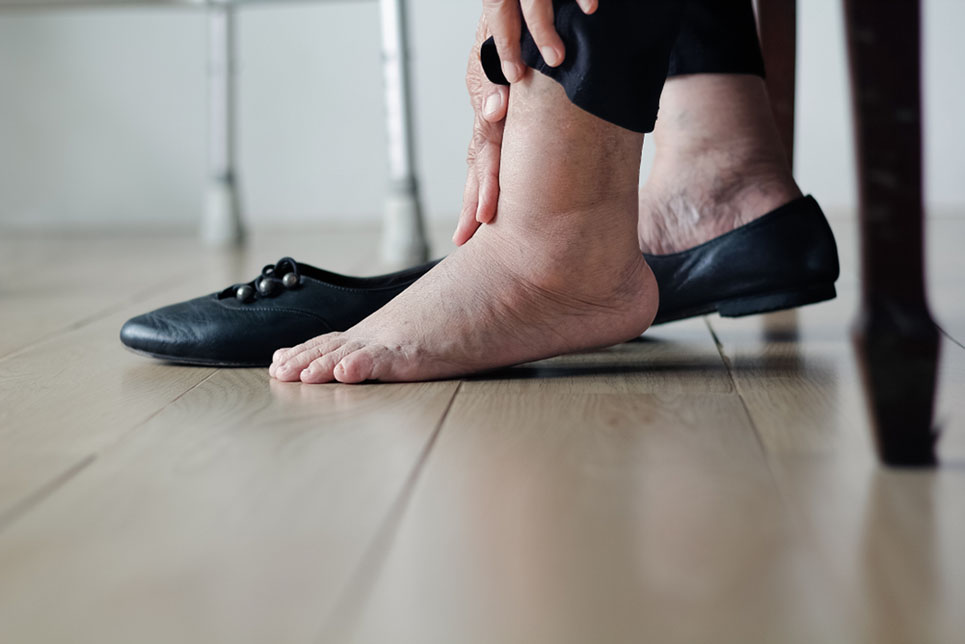What Causes Swollen Feet in Elderly People?
By Toa55 / Shutterstock.com
Many elderly people struggle with swollen feet, particularly in the afternoon and evening. You’re probably wondering why this pesky problem keeps bothering you. In this quick guide, we explain why seniors often have swollen feet and then offer several different ideas for managing lower body swelling.
3 Causes of Swollen Feet in Elderly People?
1. Edema
Swelling is technically known as edema, and it’s quite common in older adults. One of the most likely causes of swelling is chronic venous insufficiency (CVI), which occurs when the valves in your blood vessels wear down, allowing the flow of blood to slow. All of this extra fluid can result in lower body swelling as well as varicose veins[1]. When left unchecked, CVI can cause even more serious health problems, such as ulcers and phlebitis.
2. Congestive Heart Failure
Another common cause of edema is congestive heart failure. Heart failure occurs when the heart weakens and thus doesn’t pump blood as efficiently as it should. Over the short-term, congestive heart failure causes your veins to retain fluid. If it goes on for longer, it reduces blood flow to the kidneys, which in turn triggers your body to retain salt and water[2].
3. Certain Medication
Certain drugs can also cause your body, especially your lower legs, to retain water and become swollen. Both kidney disease and liver disease, also known as cirrhosis, can sometimes leads to leg swelling as well[3]. Some older people also experience lymphedema, which occurs when the lymph system becomes overfilled with fluid. Lymphedema usually only affects one limb or side of the body, not both.
If you experience swollen legs, swollen ankles, or general leg swelling, you will likely notice that it is worse at the end of the day than when you get up in the morning. This is because gravity pulls on the fluids as you go about your day, pulling them down into your lower body. This effect is especially pronounced when you stand or sit for long periods of time. If you’re not moving around, then you’re not getting your blood and lymphatic fluid flowing. When you lie down at night, gravity directs all those fluids back to your core, slowly draining out of your legs and making them appear less swollen.
What to Do About Swollen Feet in Elderly People
First of all, you should tell your doctor if you are experiencing swollen feet. They will help you narrow possible causes and determine whether or not the swelling is a symptom of a more serious underlying health problem. If it’s the latter, then your physician will devise a treatment plan to address what is causing the swelling. You should always call your doctor ASAP if the swelling is only on one side, it’s causing a lot of foot pain and/or you are noticing other symptoms such as shortness of breath and chest pain.

If the swelling itself is the problem, then your doctor will likely recommend lifestyle changes, such as reducing your salt intake, wearing compression stockings and choosing the proper diabetic footwear. Exercising the calf muscles by running, walking or jumping will help strengthen your heart and lungs and improve circulation. If you need to temporarily reduce lower body swelling, lying down with your legs above your heart for 15-30 minutes will help redirect fluid back toward your torso. If your chronic venous insufficiency has progressed further, then your doctor might recommend venoactive agents, skin care and ulcer care in addition to the other items on this list.
While diuretics – aka water pills – can sometimes help relieve symptoms, they aren’t as effective as one might think because they don’t address the underlying causes (i.e., insufficient circulation). They can also result in unpleasant side effects such as dehydration, low blood sugar and constipation. They may also increase urination, which can worsen any existing incontinence issues. Because of these side effects, many physicians only prescribe diuretics with caution and usually recommend them in conjunction with the lifestyle changes listed above.

If you suffer regularly from swollen feet, then you know that regular shoes are uncomfortable to wear and can even make the swelling and blood circulation worse. That’s why we advise wearing shoes for swollen feet that were specially designed for this issue. When buying shoes online from a store such as Silverts, make sure that you know how to measure shoe size at home so you can get the most accurate and comfortable fit. Order more than $50 of shoes (or any other product) from Silverts and you’ll get free shipping on your U.S. order!
Sources
- John Hopkins Medicine. Chronic Venous Insufficiency. https://www.hopkinsmedicine.org/health/conditions-and-diseases/chronic-venous-insufficiency
- Mount Sinai. Heart failure – overview. https://www.mountsinai.org/health-library/diseases-conditions/heart-failure-overview
- Mayo Clinic. Cirrhosis. https://www.mayoclinic.org/diseases-conditions/cirrhosis/symptoms-causes/syc-20351487





Comments
[…] What Causes Swollen Feet in Elderly People? […]
This site was very helpful; in fact, the picture of swollen feet is EXACTLY like my feet, which gave me confidence in what I was reading. Additionally, the causes of swollen feet/ankles fit me perfectly. Now, I’ll go see my doctor.
Need better fitting shoes because of swelling feet. Can you help me?
Hi Ellen, we do have shoes and slippers designed for wider and swollen feet. You can check them out here – https://www.silverts.com/shop-by-need/swollen-feet